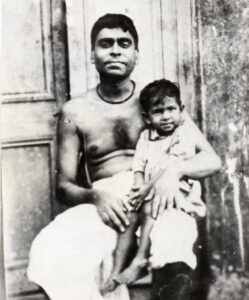In the heart of the sacred Gauḍīya Vaiṣṇava tradition, there is a story that vividly illustrates the courage and spiritual insight of a young boy who would later become one of the most influential figures in the modern Vaiṣṇava movement. The boy, Bimala Prasada, would eventually be known as Śrīla Bhaktisiddhānta Sarasvatī Ṭhākura, a dynamic reformer who fearlessly upheld the standards of pure devotion. This story serves as a testament to his unflinching dedication to spiritual principles, even from a very young age.
The Humble Disciple
Once, Śrīla Bhaktivinoda Ṭhākura, a revered ācārya and prominent spiritual leader, visited his guru, Vipin Bihari Goswami, accompanied by his young son, Bimala Prasada. Bhaktivinoda Ṭhākura’s dealings with his spiritual master were always marked by humility and respect. He faithfully performed his duties as a disciple, bowing down and paying obeisances to his guru whenever they met. This time was no different, as Bhaktivinoda Ṭhākura humbly bowed at the feet of Vipin Bihari Goswami, demonstrating the ideal conduct of a disciple.
A Bold Young Boy’s Rebuke
However, what happened next would not go unnoticed by the seven-year-old Bimala Prasada. Vipin Bihari Goswami, upon receiving Bhaktivinoda Ṭhākura’s respects, placed his feet on his disciple’s head. To the young Bimala Prasada, this was an act of arrogance and spiritual misjudgment. Although it was customary for a disciple to show respect to the guru, the reverse—placing one’s feet on the head of such an exalted soul like Bhaktivinoda Ṭhākura—was highly inappropriate. When Bhaktivinoda left the room, Bimala Prasada decided to confront the situation head-on.
The Unspoken Truth
With the boldness that would characterize his later life, Bimala Prasada addressed Vipin Bihari Goswami directly: “You are acting like a big, big guru, placing your feet on the heads of those whom you do not truly recognize. If you knew who my father really is, you would not have acted in such a way. My father is an exalted nitya-siddha (eternal associate) of Śrī Rādhā and Kṛṣṇa, sent to fulfill Their divine mission. It is inappropriate for you to assume a superior position to such a person. By your actions, you have shown yourself to be a kaniṣṭha-adhikārī, a neophyte unable to discern the spiritual position of others.”
Changing the Subject
At that moment, Śrīla Bhaktivinoda Ṭhākura re-entered the room, and the conversation promptly shifted. Vipin Bihari Goswami, perhaps taken aback by the young boy’s fearlessness, did not pursue the matter further. But the young Bimala Prasada’s words had undoubtedly left an impression.
The Guru’s Reaction
Later, Vipin Bihari Goswami expressed his thoughts to Bhaktivinoda Ṭhākura, saying, “Your son is bold to the point of being rude.” The guru’s comment reflected a limited understanding of the situation; what had appeared to be rudeness was actually an expression of deep spiritual conviction.
A Father’s Humorous Reflection
When Bhaktivinoda Ṭhākura learned about the incident, he did not rebuke his son. Instead, he would humorously recount the event to his friends, often praising Bimala Prasada’s courage. “My son is so fearless,” he would say with a smile, “that he even chastised my guru, Vipin Bihari Goswami.” The proud father saw in his son a fearless dedication to upholding Vaiṣṇava principles, a quality that would serve him well in his future role as a reformer.
A Glimpse of the Future Reformer
This incident was more than just an example of a young boy’s audacity; it was a foreshadowing of Bimala Prasada’s future mission. Later, as Śrīla Bhaktisiddhānta Sarasvatī Ṭhākura, he would challenge superficial spiritual practices and reform the Gauḍīya Vaiṣṇava movement by emphasizing genuine devotion over external formalities. His uncompromising stance on preserving the highest standards of Vaiṣṇava behavior would make him a respected, though sometimes controversial, figure.
Lessons to Be Learned
- Spiritual Discernment Over Formality: The incident teaches that true spiritual recognition goes beyond mere formalities. It requires understanding the genuine spiritual stature of advanced devotees, irrespective of conventional roles.
- The Importance of Upholding Vaiṣṇava Etiquette: While humility and respect are essential, it is equally important to defend the dignity of great souls. Recognizing and honoring spiritual advancement in others is a vital aspect of Vaiṣṇava etiquette.
- The Role of a Guru and Disciple: The story illustrates that the relationship between guru and disciple is founded not only on external practices but on mutual spiritual realization and respect.
- Courage in Speaking the Truth: Sometimes, upholding spiritual principles requires courage, even if it means challenging established authority. The young Bimala Prasada showed that true devotion may demand fearlessness in speaking the truth.
- Embracing the Spirit of Reform: The incident highlights the importance of challenging superficiality in spiritual practices and maintaining the highest standards. This spirit of reform would later characterize Bhaktisiddhānta Sarasvatī Ṭhākura’s mission to purify the Gauḍīya Vaiṣṇava tradition.

